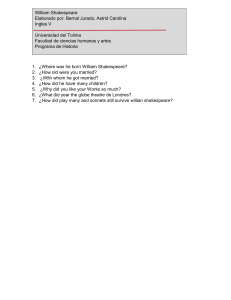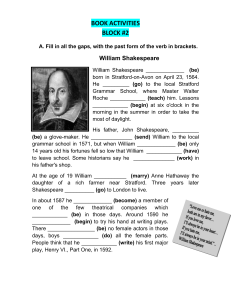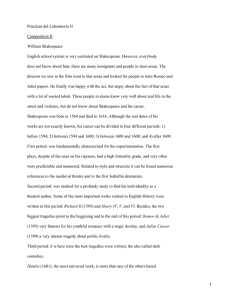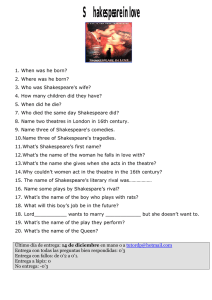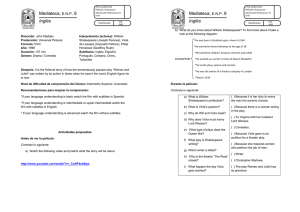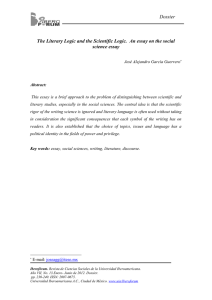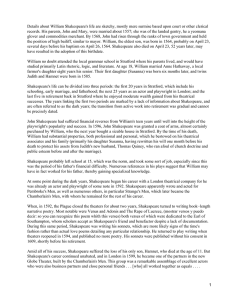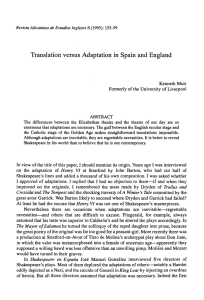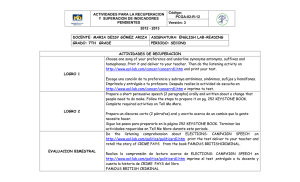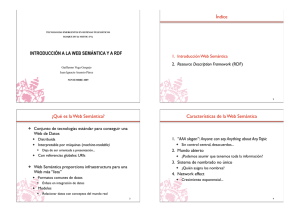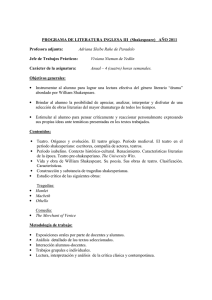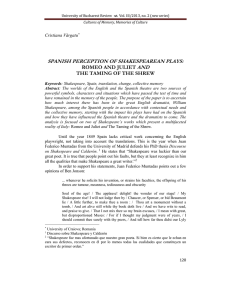Borrador de propuestas debatidas en la reunión de
Anuncio
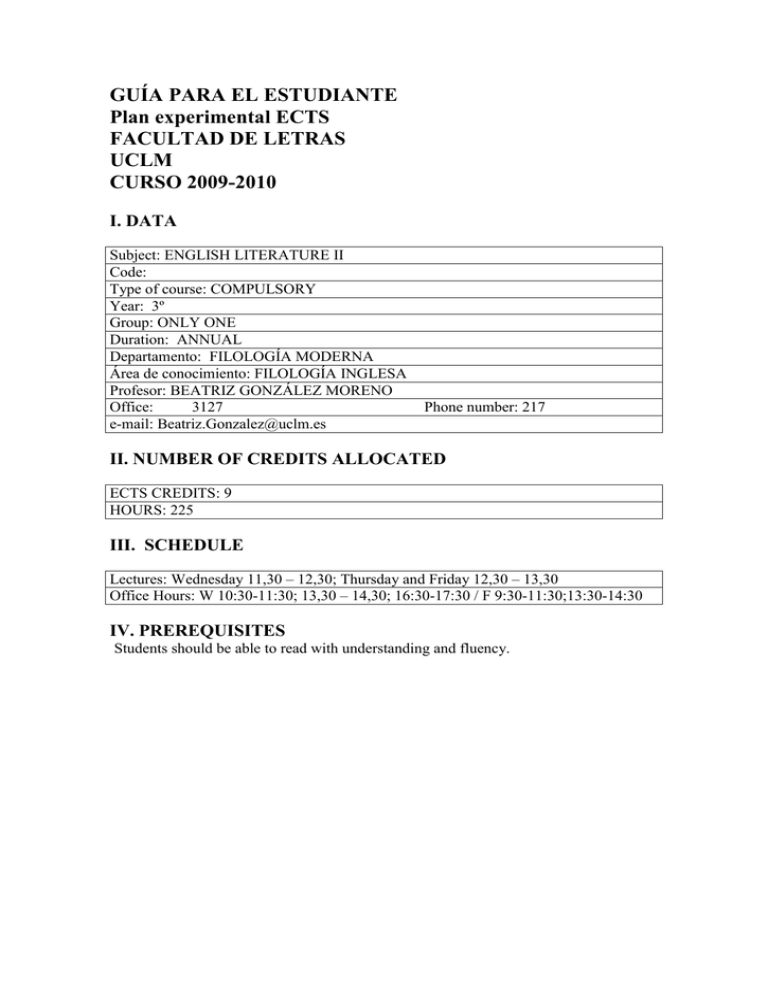
GUÍA PARA EL ESTUDIANTE Plan experimental ECTS FACULTAD DE LETRAS UCLM CURSO 2009-2010 I. DATA Subject: ENGLISH LITERATURE II Code: Type of course: COMPULSORY Year: 3º Group: ONLY ONE Duration: ANNUAL Departamento: FILOLOGÍA MODERNA Área de conocimiento: FILOLOGÍA INGLESA Profesor: BEATRIZ GONZÁLEZ MORENO Office: 3127 e-mail: Beatriz.Gonzalez@uclm.es Phone number: 217 II. NUMBER OF CREDITS ALLOCATED ECTS CREDITS: 9 HOURS: 225 III. SCHEDULE Lectures: Wednesday 11,30 – 12,30; Thursday and Friday 12,30 – 13,30 Office Hours: W 10:30-11:30; 13,30 – 14,30; 16:30-17:30 / F 9:30-11:30;13:30-14:30 IV. PREREQUISITES Students should be able to read with understanding and fluency. V. AIMS The aim of the course is to acquaint students with basic developments in the history of English literature from the Renaissance period to the 18th century (metaphysical poetry). The course will look at a variety of literary texts and examine their formal features as well as the cultural, social, historical and political contexts in which they appeared. VI. COMPETENCIES Students who successfully complete this course will be able to demonstrate the following on appropriate testing/evaluation instruments: 1. An ability to analyze a piece of literature from the assigned period and effectively write about it using appropriate critical strategies and other materials required by the instructor. 2. An ability to appreciate literature in its broader social context and thereby garner insights into the human condition through examination of such fundamental relationships as those between man and self, man and society, and man and Nature. 3. An appreciation for the historical context of literature, how it affects and reflects the age in which it was written, and how it is linked to broader historical currents in politics, philosophy, psychology, science, art, and music as well as how it resonates within contemporary culture. 4. An ability to produce clear, correct, and coherent prose adapted to purpose, occasion and audience (eg. Didactic unit / temario de oposiciones) 5. An ability to communicate orally in clear, coherent, and persuasive language appropriate to purpose, occasion, and audience (eg. Didactic unit / temario de oposiciones) VII. CONTENTS: A) CONCEPTS PART I The Sixteenth Century (1485 –1603): Tudor and Elizabethan Age To introduce the students to the main literary productions of the Elizabethan Period. The rise and evolution of the English sonnet: to comment on the main features of Elizabethan poetry. To introduce students to Shakespeare as a poet. To familiarize them with some plays by the Predecessors of Shakespeare. To comment on the themes, structure, characters, language and style of some Shakespeare plays PART II: The Early Seventeenth Century (ca.1603-1660) To distinguish between metaphysical and cavalier poets. To comment on Elizabethan drama after Shakespeare To introduce students to the literary modes of the early seventeenth century. To discuss the main features and relevance of Milton and his Paradise Lost PART III: The Restoration and the Eighteenth Century To introduce the student to the rise of the English novel To comment on the concept of satire (both in poetry and in prose) and review the concept of utopia To comment on the literary modes of the century B) PROCEDURES At the end of the course, the student should have demonstrated through tests, quizzes, reading assignments, research assignments, class discussions, and writing assignments all of the following knowledge: 1. The ability to write clearly and analytically about British literature. 2. Knowledge of the connections between different pieces of literature in terms of theme, subject, form, style, and motif. 3. Knowledge of various ways of approaching works of literature, which may include formalism, structuralism, gender studies, psychoanalytical, etc. 4. Knowledge of appropriate literary terms. C) ATTITUDES At the end of the course, the student should be aware of the following: 1. Awareness of continuing influence of literary works in popular culture. 2. Awareness of influences of culture on literature and the literature on the culture. 3. Awareness of the humanistic aspects of British literature. 4. Awareness that literature offers many possible interpretations and that its viability depends on making personal connections. 5. Awareness of the emotional richness of language in literature. At the end of the course, the student should have demonstrated an ability to do the following: 1. Ability to make connections between different pieces of literature in terms of theme, subject, form, style, and motif. 2. Ability to analyze and discuss literature and to contribute to class discussion. 3. Ability to write clearly and effectively about British literature. 4. Ability to define and correctly use literary terms appropriate for the material. VIII. BIBLIOGRAPHY AND OTHER RESOURCES ÁLVAREZ RODRÍGUEZ, Román (1998). ―De la novela gótica a la novela histórica, 1760–1840.‖ En José Antonio Álvarez Amorós, ed., Historia crítica de la novela inglesa, 65–106. Salamanca: Colegio de España. HATTAWAY, Michael (2002). A Companion to English Renaissance Literature and Culture. Oxford: Basil Blackwell. KEARNS, David (1993). How to study Milton. London: Macmillan. MEDRANO VICARIO, Isabel (1998). ―Los orígenes de la novela inglesa y su desarrollo en el siglo XVIII, 1660–1760.‖ En José Antonio Álvarez Amorós, ed., Historia crítica de la novela inglesa, 11–63. Salamanca: Colegio de España. MEHL, Dieter (1987). Shakespeare’s Tragedies: An Introduction. Cambridge: Cambridge University Press. OGBORN, Jane y Peter BUCKROYD (2001). Satire. CUP. (Cambridge Contexts in Literature) ONEGA, Susana, ed. (1986). Estudios literarios ingleses: Renacimiento y Barroco. Madrid: Cátedra. RICHETTI, John (1996). The Cambridge Companion to the Eighteenth Century Novel. CUP. WELLS, S. Ed. (1986). The Cambridge Companion to Shakespeare Studies. CUP. WILLMOTT, Richard (2002). Metaphysical Poetry. CUP. IX. COURSE CONTENTS: A. Set Readings PART I SHAKESPEARE: ―My mistress eyes‖, Two loves I have of comfort and despair‖ THOMAS CAMPION: ―I care Not for These Ladies‖ SHAKESPEARE’S A MIDSUMMER NIGHT’S DREAM SHAKESPEARE’S TITUS ANDRONICUS PART II JOHN WEBSTER: The Duchess of Malfi JOHN DONNE: ―The Flea‖, Elegy 19 ―To his mistress going to bed‖. GEORGE HERBERT: ―The Altar‖, ―Easter Wings‖. RICHARD CRASHAW: ―The Flaming Heart‖. HENRY VAUGHAN: ―Regeneration‖ ANDREW MARVELL: ―To His Coy Mistress‖ BEN JONSON: ―Song: To Celia‖, ―Slow, Slow, Fresh Fount‖, ―Still to be Neat‖. ROBERT HERRICK: ―Delight in Disorder‖, ―To the Virgins, to Make much of Time‖ RICHARD LOVELACE: ―To Lucasta, Going to the Wars‖, ―To Althea, from Prison‖ JOHN MILTON: Paradise Lost. ―The Verse‖, The Arguments, Book I:1-26; bk. II; bk III: 1-55; bk. IX: 1-47. PART III John Dryden: ―A Song for St. Celia’s Day‖ Alexander Pope: The Rape of the Lock Jonathan Swift: A Modest Proposal From Gulliver’s Travels: Part 4: A Voyage to the country of the Houyhnhnms. Daniel Defoe: Robinson Crusoe (Ed. Penguin, OUP, etc.) Laurence Sterne, Tristram Shandy (online review of some excerpts) ** Most of the above readings can be found in The Norton Anthology of English Literature, volume I (eighth edition). B. In-class activities: Lectures: presentation and analysis of topics and units Practical commentaries: discussion of specific questions and problems related to the set readings C. Teacher-guided activities: Advice concerning written essays and oral presentations Problem-solving sessions related to both contents and the evaluation process. D. Students’ work Students should be aware of the fact that they are obliged to bring to the classroom the texts that are going to be discussed on that definite session. They are also expected to actively engage in class discussions. Please, make sure that you keep up with the readings. It is essential for the accurate development and advancement of the course, for most classes will be devoted to definite discussions of literary works. The methodology of the course is not based on taking vacuous notes, but on developing a serious critical approach to literary works of any kind. Do not count on catching up with your readings in the last two weeks: it simply would not work. Methodological description Activities Type Lectures Practical Sessions In-class Tutorials Self-Work (estimated workload for the student) TOTAL Work Hours Assessment Percentage 28 Final exam 12’4 % In-class 28 Final exam 12’4 % Teacher-guided 16 Essay 7’2 % Preparing class work, set readings, etc 153 Final exam 68% 225 X. WORKPLAN WEEK 1 2 3 4 5 6 7 8 9 10 11 12 13 14 ACTIVITY Lecture: Introduction to the Renaissance Practice: Renaissance Poetry Lecture: Shakespeare and Elizabethan drama Practice: A Midsummer Night’s Dream Practice: A Midsummer Night’s Dream Practice: Titus Andronicus Practice: Titus Andronicus Lecture: Introduction to the Seventeenth –Century /Jacobean drama Practice: The Duchess of Malfi Practice: The Duchess of Malfi Lecture: Introduction to Seventeenth-Century Poetry Practice: Metaphysical Poets Practice: Metaphysical Poets Practice: Metaphysical Poets 100 % 15 16 17 18 19 20 21 22 23 24 25 26 27 28 Practice: Cavalier Poets Lecture and practice: Paradise Lost Practice: Paradise Lost Practice: Paradise Lost Lecture: Introduction to the Eighteenth-Century/ Satire John Dryden: ―A Song for St. Celia’s Day‖ Practice: The Rape of the Lock Practice: A Modest Proposal Practice: From Gulliver’s Travels: Part 4: A Voyage to the country of the Houyhnhnms Lecture: Introduction to the Rise of the Novel (cont) Practice: Robinson Crusoe Practice: Robinson Crusoe Practice: Tristram Shandy Revision XI- ASSESSMENT CRITERIA The assessment criteria involve a combination of continuous assessment, practical work, assignments and a final exam. The overall mark at the end of the year comprises 30% continuous assessment and 70% final exam. For those students who have failed to achieve the practical works required or who haven’t attended classes regularly the overall mark will be exclusively that of the final exam. Written Assignment. Write ONE essay on any topic chosen from the clusters below. In order to do that, you have to explore Norton Literature Online at http://www.wwnorton.com/college/english/nael/ I. The Sixteenth Century *The Magician, the Heretic, and the Playwright *Renaissance Exploration, Travel, and the World Outside Europe *Dissent, Doubt, and Spiritual Violence in the Reformation *Island Nations II. The Early Seventeenth Century *Gender, Family, Household: Seventeenth-Century Norms and Controversies *Paradise Lost in Context *Civil Wars of Ideas *Emigrants and Settlers II. The Restoration and the Eighteenth Century *A Day in Eighteenth-Century London *Slavery and the Slave Trade in Britain *The Plurality of Worlds *Travel, Trade, and the Expansion of Empire Essays are to be submitted in paper (typed written), not by email. Email submission will be ignored and will amount to a non-submission. The same will happen if a written assignment is submitted after the deadline. Due date: final exam The following web pages could be of great help to get you started: http://www1.aucegypt.edu/academic/writers/ http://owl.english.purdue.edu/owl/resource/557/01/ http://www.theory.org.uk/david/essaywriting.pdf http://www.lc.unsw.edu.au/onlib/pdf/essay.pdf Class Participation: Regular and active class participation—including, of course, doing the readings—is essential, and amounts to an important part of your grade. Class participation obviously includes class attendance (if you’re not there, you’re not participating). Final Exam: A compulsory final examination consisting mainly of a text commentary and two questions about the compulsory readings of the course. Students will have to answer these questions in coherent essay form. Grading: Written assignment 10 % Oral presentations 10 % Class participation and tutorial 10 % Final exam 70 % Plagiarism Policy All homework assignmen ts, projects, papers and examinations submitted to a course are expected to be the student's own work. Students should always take great care to distinguish their own ideas and knowledge from information derived from sources. The term "sources" includes not onl y published primary and secondary material, but also information and opinions gained directl y from other people. The responsibilit y for learning the proper forms of citation lies with the individual student. Quotations must be placed properl y within q uotation marks and must be cited full y. In addition, all paraphrased material must be acknowledged completel y. Whenever ideas or facts are derived from a student's reading and research or from a student's own writings, the sources must be indicated. Students who, for whatever reason, submit work either not their own or without clear attribution to its sources, will be allocated a FAIL grade in that subject (this document is based on the Harvard Universit y Policy). FICHA DE EVALUACIÓN ECTS PLAN EXPERIMENTAL ECTS Fotografía FACULTAD DE LETRAS UCLM CURSO 2008-2009 APELLIDOS TELÉFONO ASIGNATURA TITULACIÓN PROFESOR/ES Nombre e-mail CURSO GRUPO Observación Actividades desarrolladas Actividades en el aula: - Clases teóricas: explicación del temario - Actividades prácticas como aplicación de los contenidos teóricos - Pruebas de evaluación Actividades guiadas: - Seminario: actividad sobre un tema monográfico - Orientación de trabajos: explicación y revisión de trabajos individuales y en grupo - Tutorías de grupo: aclaración de dudas y actividades previas a la evaluación, instrucciones sobre búsqueda bibliográfica y manejo de la Biblioteca universitaria, laboratorio de idiomas, etc. - Debates - Salidas de campo y prácticas, visitas a museos... - Prácticas de laboratorio Trabajo autónomo del alumno: - Consulta bibliográfica y de otros materiales multimedia - Estudio de contenidos del temario - Elaboración de trabajos - Preparación de pruebas de evaluación CALIFICACIÓN FINAL Valoración
